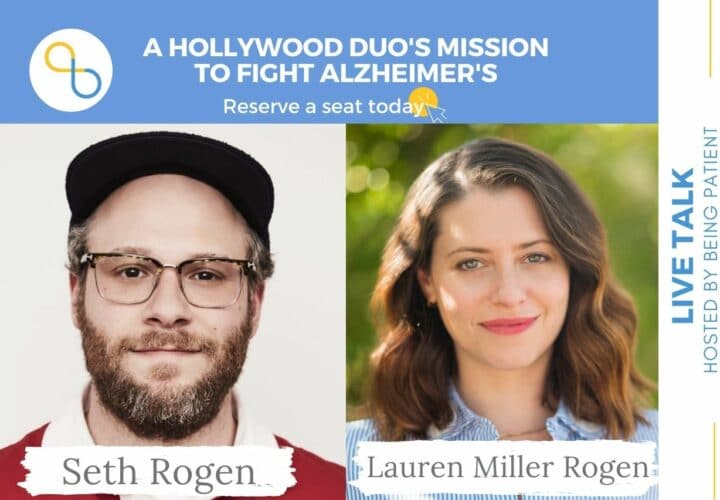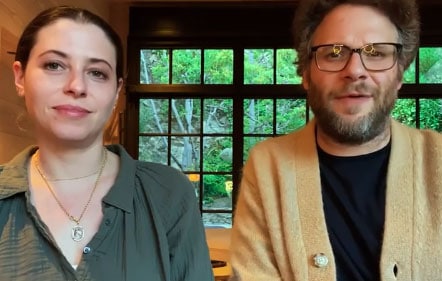As part of our LiveTalk series in 2021, Being Patient spoke with Seth Rogen and Lauren Miller Rogen about their mission to raise awareness about Alzheimer’s and brain health. For the Hollywood power couple, the battle against the disease is personal.
After actor Lauren Miller Rogen’s mother was diagnosed with Alzheimer’s, she and her husband, actor Seth Rogen, decided to apply their powers of entertainment and comedy to try to make a positive difference. In 2012, the Hollywood power couple hosted a variety show to raise funds for Alzheimer’s research and to raise awareness. The event was a success, and they stayed with the cause, shaping the mission into nonprofit organization Hilarity for Charity (HFC). Today, the organization provides at-home care for people living with dementia who otherwise wouldn’t be able to afford it.
Being Patient spoke with the couple about how their first-hand experience with Alzheimer’s has shaped their efforts in fighting the disease — and about the lifestyle choices — from a healthy diet, healthy sleep, exercise and learning new skills — critical to protecting our brain health and living better for longer.
Being Patient: Lauren, tell us about your family’s journey with Alzheimer’s.
Lauren Miller Rogen: Unfortunately, before my mom had Alzheimer’s, her mother and father had Alzheimer’s. So, I was familiar with it. My grandfather passed away when I was 12, and my grandmother passed away when I was 18.
Then at my college graduation, my mom started repeating herself. She told me the same story a few times. I had a lot of denial about it, but I just knew. Over the next couple years, things definitely got worse. She started repeating herself even more and by the time she was 54, it was pretty clear that there was really something happening. Although we somewhat expected [the Alzheimer’s diagnosis], it was obviously completely devastating. We spent a long time feeling lost and scared.
My mom was a teacher for 35 years. She taught first grade, and she was someone who was really active and vibrant and has a lot of friendships.
Eventually, it got worse and my dad had to retire to care for her and we hired someone to come into the house. Fortunately, we were able to afford that. We moved my parents closer to us so we could help.
We got a duplex for my parents, which was a really amazing setup. My mom was on one side with a caregiver and my dad was literally right next door and on the other side of the wall. He could be there as much as he needed but also go to his side and close the door and take a breath if he needed that.
We had 24-hour care there with her — amazing angelic caregivers on top of my dad, who was completely devoted to taking care of her, feeding her and lifting her from her bed to her chair and back to bed. It’s truly a 24/7 job.
About seven or eight years into her journey, she stopped being able to walk. In the last five years or so, she was bedridden and nonverbal. She completely needed help doing everything that a human being does. We lost her last February, which is devastating but at the same time, after a 15 year journey and waiting for my mother to die, I feel like we finally felt some relief.
Being Patient: Was she ever worried that she would get Alzheimer’s given her family history?
Lauren Miller Rogen: She would talk about it often. This is before she showed any symptoms … One time I asked her if she was scared and I remember we ended up having the conversation in the Target parking lot. She said she wasn’t scared for herself, but she was scared for me and my brother and my dad. She knew that she would be taken care of, but she was worried about us. She was a selfless woman.
Being Patient: Seth, has your side of the family been affected by Alzheimer’s?
Seth Rogen: Alzheimer’s is actually not very prevalent on my side of the family. We are Jews who die of other things and we come to our untimely end in a myriad of other ways: heart disease, high cholesterol, diabetes, things like that.
I’ve never really seen Alzheimer’s firsthand until meeting Lauren, seeing what happened with her mother. It was very eye opening.
It’s one of those things that the more we’ve gotten into it, the more we’ve found that there is a lot of hope, but we live in a very weird time. It’s like that time in history when they didn’t know smoking was bad for you. People don’t take care of their brains. They don’t understand how to take care of their brains. Doctors don’t educate patients as to how to take care of their brains.
Being Patient: What advice would you give for partners of people who have family members living with Alzheimer’s?
Seth Rogen: Implore your partner to seek a therapist or a professional who is more equipped to deal with these types of emotions. As I said to Lauren very early on, I can be supportive, but I don’t actually understand how to help you navigate this in a meaningful way.
Being Patient: Was there a place for humor during Lauren’s mother’s journey with Alzheimer’s?
Seth Rogen: For me as an outsider, every time I’ve seen Alzheimer’s portrayed in anything, it was generally in older people with a phase of light hearted forgetfulness before the darkness really creeped in. With Lauren’s mother, there was never that phase. It went very dark, very fast. There was never an opportunity to use humor in any way shape or form when relating to Lauren’s mother or family about what was happening.
But if you’re in a situation where your family member or a loved one can relate [by using humor], then that’s great. [For us], it went from horrifying to more horrifying to more horrifying on a day to day basis. It was not funny.
Lauren Miller Rogen: I will add though that I’ve heard many doctors say, ‘If you’ve seen one case of Alzheimer’s, you’ve seen one case of Alzheimer’s.’ Like Seth said, [humor] wasn’t really part of our journey, but it’s really a case by case basis. Things like improv and finding the lighter side can be helpful if you can do that.
We have a partnership with an organization called Laughter On Call. They specifically work with caregivers and people living with Alzheimer’s to include improvisation in their daily lives and ways to lighten situations if the person living with Alzheimer’s is able to do that.
Being Patient: What’s the mission of HFC?
Lauren Miller Rogen: We started in 2012 by doing a variety show. We work in comedy and it was the area we know so that’s what made sense to raise money and awareness for this disease. Then, we had an opportunity to really dig in and shape our mission and formed a full organization.
Our mission has really been focused on brain health but also on caregivers. We saw firsthand the toll that caregiving took on my dad and us and my brother. We’ve gotten to know so many families along the way. Being a caregiver is such an extreme burden to carry. We’ve partnered with Home Instead Senior Care and we provide at-home care for people who otherwise wouldn’t be able to afford it, but have chosen to keep their loved ones at home. We provide virtual support groups even before the pandemic because getting support through a computer can be easier than driving to a group.
We have created brain health education tools because teaching people how to use this information is really key and we will continue to go down the route of investing in prevention research.
The easiest thing you can do to take care of your brain is sleep. Develop good sleep habits, which means going to bed at the same time every night, waking up around the same time every morning, which will happen naturally if you have the same bedtime, and making sure that you have a cool room. We have a pad that we put on our bed that provides extra cooling. Blue light glasses before bed helps tell your brain that it should start shutting down. Wearing a sleep mask all night will help regulate your sleep. Wear a sleep tracker: We work with the company WHOOP, which [develops] bands that can help track your sleep and activity.
Being Patient: Are both of you actively improving your brain health?
Seth Rogen: All the time. We’re both writers, mostly by trade. It’s probably the thing we spend the most time doing throughout the day. We are very brain dependent. Both of our careers as high-fashion models dried up a few years ago, and we’ve entered into more intellectual pursuits.
Our sleep is very important. What we eat and what we don’t eat is very important for the brain. We do pottery. We’re currently enrolled in a glaze making workshop online, which is essentially intense chemistry. We have a closet full of chemicals and we’re learning what they do and how to create glazes. It’s an entirely new skill. There’s a whole part of my brain I never thought I would ever really use.
The interview has been edited for length and clarity.
UPDATED July 16, 2024, 12:15 A.M. ET – This February 2021 interview transcript has been updated to meet formatting guidelines and editorial standards.



Really enjoyed your interview with Seth and Lauren! Thank you Debs!
Loved watching the video with the Rogens. I was wondering how our Center could become a part of your being patient educational series. We are located in SC..a state in desperate need of services for those with dementia. We opened our day Center in 2019 as Alice’s Memory Care Day Center, medical model, totally private owned, early to midstage members. We are as much for caregivers as we are for our members. Please let me know how we can help!
I cared for mom with Vascular Dementia almost 10 years, put my life on hold she passed a horrible after Christmas of 2021 and now I been trying to get my life back on track and having very very hard time.